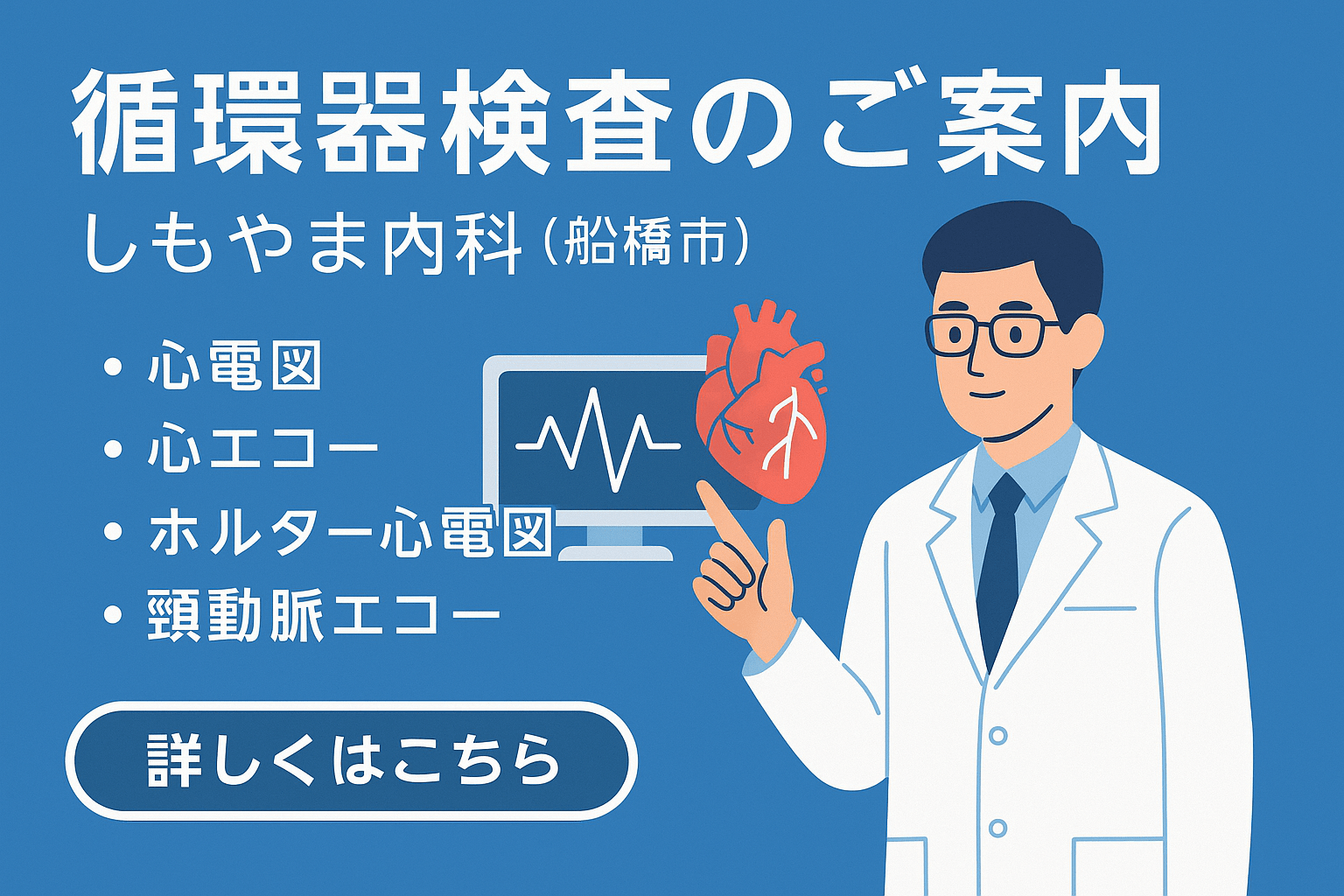🔊 このページの要点
心不全は心臓のポンプ機能が低下した状態で、息切れ・むくみ・体重増加がサインになります。
しもやま内科(船橋市)では心エコー・頸動脈エコー・ホルター心電図・心電図・レントゲン・採血を院内で実施し、循環器専門医が診断と管理を行います。
心不全は、「心臓のポンプ機能の低下」によって全身に血液を十分に送ることができなくなる状態を指します。息切れやむくみといった症状は、加齢や疲労と見過ごされがちですが、実は心不全のサインであることもあります。
このページでは、船橋市のしもやま内科が、循環器専門医の視点から心不全に関するよくある質問に丁寧にお答えします。心配な症状がある方は、早めの受診と検査をおすすめします。

📍 船橋市で心不全が気になる方へ
しもやま内科では、心エコー・頸動脈エコー・ホルター心電図・心電図・レントゲン・採血を活用し、心不全の診断と管理に取り組んでいます。気になる症状がある方は、お早めにご相談ください。
しもやま内科では、心エコー・頸動脈エコー・ホルター心電図・心電図・レントゲン・採血を活用し、心不全の診断と管理に取り組んでいます。気になる症状がある方は、お早めにご相談ください。
🩺 心不全に関するよくあるご質問
心不全とはどのような状態ですか?
心臓のポンプ機能が低下し、全身に十分な血液を送れなくなる状態を指します。原因や重症度により症状は異なります。
初期症状には何がありますか?
息切れ、動悸、疲れやすさ、夜間頻尿、足のむくみなど。早期発見が重要です。
心不全は治る病気ですか?
完全に「治る」とは限りませんが、適切な治療と生活習慣の改善でコントロールが可能です。
しもやま内科ではどのような検査が受けられますか?
胸部レントゲン、心電図、ホルター心電図、心エコー、頸動脈エコー、採血などに対応し、原因・進行度を評価します。
心不全の主な原因は?
高血圧、心筋梗塞、弁膜症、不整脈、心筋症など。背景疾患の精査が重要です。
治療で使われる薬は?
利尿薬、ACE阻害薬/ARB、β遮断薬、SGLT2阻害薬など。状態に応じて組み合わせます。
生活で気をつけることは?
塩分制限、水分管理、体重コントロール、禁煙・節酒、適度な運動。自己管理が再発予防につながります。
いつ受診すべき?注意が必要なサインは?
急な息切れ、短期間の体重増加、むくみや倦怠感の悪化があれば早めに受診してください。
高齢者の心不全の特徴は?
食欲不振や認知機能低下など非典型的症状で気づきにくいことがあります。定期診察が大切です。
診断後はどう向き合うべき?
長期管理が必要な慢性疾患です。医師と連携し、無理のないペースで治療と生活調整を続けましょう。
循環器の症状でお悩みの方へ
当院では心電図・心エコー・ホルター心電図・頸動脈エコーなどを院内で実施しています。動悸・息切れ・胸の痛みなどがあればご相談ください。
👨⚕️ この記事の監修医師
下山 立志(しもやま たつし)
しもやま内科 院長
日本内科学会 総合内科専門医/日本糖尿病学会 糖尿病専門医・指導医/日本循環器学会 循環器専門医
日本老年医学会 老年病専門医・指導医/日本甲状腺学会 甲状腺専門医
しもやま内科 院長
日本内科学会 総合内科専門医/日本糖尿病学会 糖尿病専門医・指導医/日本循環器学会 循環器専門医
日本老年医学会 老年病専門医・指導医/日本甲状腺学会 甲状腺専門医
